Question: We already have an open adoption. My son is 4 years old and I keep wondering: when is a good time to tell him that he was adopted?
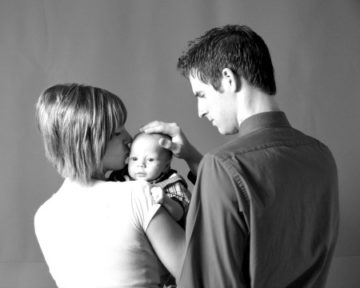
I still think its too early right now, but when do other parents start to open up about this? I just don’t want to make it a huge thing in his life, but he does have other half-brothers and sisters out there and I do want him to reach out to them if he ever decides that’s what he wants.
~~ Mary
When to Tell a Child S/He Was Adopted
Dear Mary: It sounds as though you are defining “open adoption” as having contact with birth parents. A more important component is the ability for an adoptive family to talk about adoption. For this reason, it’s good that you are asking this question NOW. For it’s not just a matter of telling once, it’s a matter of being able to talk about adoption with ease as your child passes developmental and identity-building milestones over the years.
Let’s address when to tell. Adam Pertman, President of the National Center on Adoption and Permanency, tells of his social worker friend who once advised that you should tell “on the way home from the hospital.”
This is because it’s arguably more about you becoming comfortable with delivering the story than about your child being able to receive it.
Trust is a fundamental part of your relationship with your son, upon which everything else rests. So you must tell, and soon. If you have a series of little talks, you won’t have to have The Big Talk. The more you can normalize the way you yourself think about it, the more matter-of-factly your son will be able to take it in and incorporate it into his identity. He will take many of his cues from you, so it’s wise if you first see if you have any sensitive spots in talking about it — much like having the Birds & Bees talk.
Denying vs Dwelling
I can understand your not wanting to make adoption bigger than necessary. But by waiting to tell, you run that risk. Why? Because avoiding the discussion may mean that the subject carries an emotional a charge for you. And by not dealing with it, that emotional charge does not get resolved and may even intensify.
As adoptive parents, we want to find the sweet spot between dwelling on adoption and denying its effects. Somewhere in between is a healthy place to be.
I find that bedtime is a good time to have focused and relaxed conversations. My children loved Jamie Lee Curtis’ Tell Me Again About the Night I Was Born, and I’ve also heard wonderful things about Gayle Swift’s ABC, Adoption & Me. To find others that fit your situation, check out the collection at Tapestry Books.
See also: check out the comments on this post about giving an adopted person ALL of their story.
Dear Readers, what say you?
~~~
About this Open Adoption Advice Column
- I may occasionally call on others to help with answers, to tap into group wisdom.
- I am not trained as a therapist. Please do not rely on words in this space to make your own major or minor decisions.
As always, readers are encouraged to weigh in thoughtfully and respectfully. I ask everyone to remember that this is a teaching endeavor rather than a shaming endeavor, and that we aim to bring light rather than heat. It’s my belief that people do the best they can with what they have to work with, and our goal is to give folks more to work with.
Send in your own open adoption question. I’ll either offer an answer or find someone who can address your issue.
~~~~~
Lori Holden, mom of a young adult daughter and a young adult son, writes from Denver. She was honored as an Angel in Adoption® by the Congressional Coalition on Adoption Institute.
Her first book, The Open-Hearted Way to Open Adoption: Helping Your Child Grow Up Whole, makes a thoughtful anytime gift for the adoptive families in your life. Her second book, Standing Room Only: How to Be THAT Yoga Teacher is now available in paperback, and her third book, Adoption Unfiltered, is now available through your favorite bookseller!
Find Lori’s books on her Amazon Author page and catch episodes of Adoption: The Long View wherever you get your podcasts.

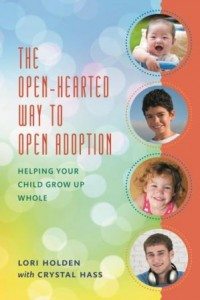
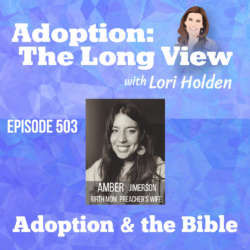
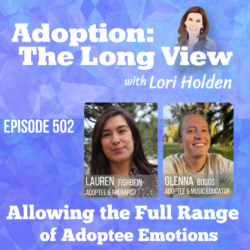
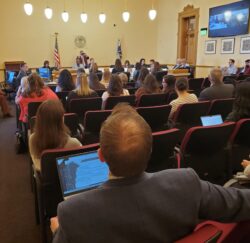
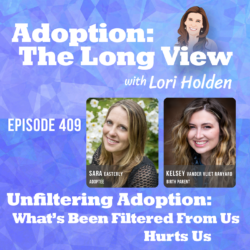

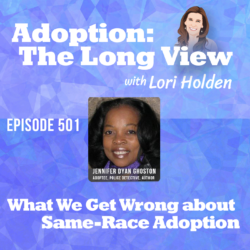

26 Responses
I’m of the tell-at-the-beginning school when it comes to giving personal information — anything that will cause a divide between knowing and not knowing. There will be enough revelations in life that you can’t control. I would never build one for myself that I could control.
But avoiding the topic doesn’t mean there is an emotional charge. I can think about things I wasn’t told as a child, and it had nothing to do with the subject being one that my parents found difficult to talk about. I mean, yes, that could be reason for avoidance, but that’s not the only possible reason for not talking about it.
We started telling our daughter, now 4.5 years old, when we were still in the hospital with her at birth. She had a bit of an extended.
It was definitely as much to practice and hear the words themselves for our own benefit as it was to be forthcoming. And we’ve found over these years that it has been profoundly important for her to know as she processes and ponders. Together my husband and I wove a simplified, but thoroughly true telling of her birth and adoption and have found the need to expand and deepen the telling as we’ve gone along.
I would encourage every adoptive parent to consider telling as soon as possible, in a simple, age-appropriate way that leaves room for more details and definitions down the line.
Along with having access to their story, it may hopefully allow our children a little more comfort knowing that we are open to talking about it, answering questions and telling what we know.
After we had gotten pretty good at the telling, we created a photo book, using the same language we use to speak it, with photos that have helped our daughter to further process that this is HER story. We had a few copies printed, and one is hers to handle as she wishes, with all the smudgy finger prints and dog-eared pages she’d like. She chooses to show it or not as she likes, and often asks us to read it with her and talk about it. And we’ve tucked more copies away for later.
Oh, yes, Marie. I see that the side benefit of telling (besides the child knowing) is that they also know you are open to talking about other things.
Love the idea of turning the story into a story/picture book!
We’ve told our kids since birth. My son doesn’t remember being told he was adopted. He’s just always known. He grasped the concept at a very early age – about 3. My daughter is 3 now, and she doesn’t really get it, but she at least knows the words, that she has 2 sets of parents, siblings, etc.
Adoptive parents need to start adoption talks before the kids can even understand. That’s for us – so we can practice what to say by the time they do understand.
as an adoptee- I have to say the answer is- DAY ONE! Even before your child may understand words or adoption- DAY ONE is the time to tell your child. For me, knowing I was adopted was much like having a belly button- it was just always there- because I ALWAYS knew. If you have not yet shared it with your child, today is the day to share their story with love and honesty in an age appropriate way.
Word!
I agree with the answer and all the comments — LW, you’re late already, and I think that the advice to look at WHY you’ve put this off for four years is really good. If you already have an open adoption, I’m sure you child is old enough to know that something is different here from other families. So figure it out from your point of view, and then start talking.
And remember it isn’t A telling. It is part of your child’s story, and it always will be, so don’t tell him until he understands what “adoption” is and stop. Make it an ongoing conversation that lets him know that you’re open to talking about it with him forever.
And if you’re not, do what it takes to be open to whatever he needs to discuss about adoption, forever. If you aren’t, it’s like denying a part of him when part of his story is off-limits to you. Or, at least, that’s what it felt like with my adoptive parents some times. I was told, from day one. But once I was maybe 5 or 6, we just didn’t talk about it anymore, and the subject became taboo. It could be mentioned, sure. But we didn’t talk about it. In theory, I hope this is a way that open adoption can be better than the closed adoption I grew up with.
Couldn’t agree more. Mary makes it sound like it shouldn’t be a big deal in his life but it probably will be–at least initially. It may not turn out to be the deciding factor in his identity but that is his call, no one else’s.
Mary, tell him today! Even better, tell him openly that it’s something you should have told him sooner but couldn’t find the words to express it.
Agreed. It’s never too early. If he already has contact with some of his blood family, you are doing him and them a disservice by not being up front about his relationship to them.
Trust needs to be built from day one. The discovery that a “family friend” or “auntie” actually gave birth to him will make him wonder what other secrets might be unveiled later on down the road. This is not just about his adoption. It’s about a lifelong relationship he’s going to have with you, and secrecy or truth withheld in one area will carry over into others.
After he learns he is adopted, he needs as much information as you can possibly give him (age-appropriate, of course.) Children at this age are very imaginative and can easily create a fantasy family (“ghost kingdom” as B.J. Lifton called it), and the more he knows, the fewer blanks he’ll try to fill in for himself. If he has siblings, he needs to know now, so that he can have a relationship with them as he grows up.
“I just don’t want to make it a huge thing in his life,”
It seems a whole of adoptive parents have this concern as it pops up on a continual basis. It’s something that makes me ask why being adopted would be such a horrible thing to have as part of who you are, even a huge part of who you are. Is there something wrong with it? Is being adopted a shameful thing? Is it evil? No? Then perhaps it’s time to stop and ask yourself if is because adoption hasn’t been part of your entire life, and could it be that you need to get comfortable with the reality that your child is adopted, and will be adopted their entire life. Your child has no choice in the matter, you have a choice whether to embrace that part of your child, or let your child deal with that part all by himself.
A person’s identity is made up of everything that has happened to them, good or bad, large or small – we are shaped by our experiences, some will be stronger parts of our identity than other things. I’d image someone with diabetes will say it is a huge part of their identity, how can it not be when they need to monitor it constantly. Someone whose mother died shortly after birth, will always have that as part of their identity. Someone who took violin for 10 years in childhood will have that as part of their identity. A parent who is a politician will be part of their identity. Bit by a dog as a young child, yes, that’s part of who they are. Grew up as a an only child (or one of 14 siblings) will be part of their identity. Travelled extensively will be part of their identity. And those are just part of the growing up that adds to your identity, then there is career, marriage, parenthood, and everything else…
Nothing you do can remove being adopted from your child. Get comfortable with it, your child has no choice.
I encourage parents to start telling the adoption story the second they become a family (if not before)! It helps them get comfortable with the narrative and establishes a foundation. A lot of “little stories” = no “big story” and that is a plus. Kids sense when parents are not truly ok with all of the details of their history and won’t feel at ease talking about it moving forward. The truth is your friend.
As far back I can remember, I knew I was adopted. I don’t know if it wasn’t a bigger deal because I had a close-in-age brother that was adopted, too. But I believe what was missing is any dialogue other than, “I picked you out of the nursery because you had the biggest eyes!” What little she told me turned out to not be the truth. My adoptive mother would say I never asked. That would be the truth. From my experiences as an adoptee, my suggestion would be to make it feel safe for your adopted child to ask questions and to deserve answers as a worthy human being. It wasn’t like I grew up well-adjusted in a healthy family environment either, but rather I never had a conversation with any parent figure saying my voice mattered and encouraging me to talk about what I was feeling.
Thank you so much for linking up. This can be a very charged subject and I love the way you’ve approached it.
I am an adoptee, as well as an adoptive mom. I don’t ever remember learning I was adopted, it was just something I always knew. I’ve had friends who found out in their teens, so I have personally seen the devastation of keeping that secret.
My sons are 3 and 19 months. One of my 3-year-olds is very, very bright and very aware that his skin and hair don’t match Mommy’s & Daddy’s. I’ve already initiated conversations about how he and his half-brother look alike because they have the same first mommy, but his “twin” doesn’t look like him because they have different first mommies.
I’ve also consulted the twins on whether we should adopt their younger brother and keep him forever. (Usually they think yes.)
I’m sure they don’t understand much of this (if any), but I’ve started the conversation so I don’t have to dread The Talk.
We’ve been practicing ever since our sons were came home (one at 2 weeks old and the other from the hospital). It helps to practice how to say what needs to be said before they really understand it. I suggest to the mom with the 4 year old that she practice what to say before telling him, and that it needs to happen very soon. As far as age appropriateness, the books are a great way to bring adoption into the conversation. Other books I like are “Horace” and “The Lamb-a-roo”
All of the adoptees that I know either “always knew” (because they’d been told very early) or “always suspected” (because of the unexplainable quirks of being adopted). The overwhelming majority of adoptees in the “always suspected” group either had the truth withheld from them and/or were told bold-faced lies. Is that really what you want for your child?
Mary, You say that you think it is too early to tell this child that he is adopted. I would ask you: When will it be time? Are you waiting for him to start school? Turn 13? Reach adulthood? Have kids of his own? The longer you wait, the harder it is going to be to get started. The longer you wait is simply more time that you have “told” this child that adoption is inherently shameful and worthy of being kept a secret. The longer you wait is more time that you conciously withhold this child’s truth from him and violate his trust. How will you respond when he asks: “Why didn’t you tell me sooner?” or “Why have you lied to me my whole life?”
I agree with everyone else who says that you should have started telling this child he was adopted the day you brought him home. And since that didn’t happen, TODAY is the day that you should tell him. Today is the day that you should start building and honest relationship with this child and prove that you are worthy of his trust.
You bring up two really important pieces to the process Mary (and others) must go through to get to an answer:
1) when IS the right time
2) how do you make that determination
I really appreciate all the adoptee voices chiming in with their experiences.
I can’t imagine not telling an infant he was adopted along with his name.
Four seems awfully old to me. But I wouldn’t make a big deal out of it. Since it’s an open adoption (which I too can’t imagine as what do you call the first mother?) I would show him his baby book as every kid loves looking at pictures of himself as infant and be matter of fact about how he grew in his other mother’s tummy. And tell him over and over about how much he is loved. Just my feelings. Everyone is different.
Did I hear the expression “tummy mommy” in one of your posts Lori? I love it as it expresses the relationship so perfectly and is something kids can understand.
“tummy mommy”
Yuk.
That’s a polarizing term. I think I may do a future post on it. I don’t think you read about it here, though.
If there is any concern that telling too early will confuse and therefore upset the child, I would dispel that. My daughter is almost four and doesn’t fully grasp what it means to be adopted but we mention adoption or birth parents or her birth country a lot and important conversations happen in nuggets just like any other difficult-to-grasp concept. It isn’t upsetting not to understand. She’s also said things like “I wish I had pink skin like you” and 30 seconds later followed it up with “can I bang on your computer?” And she’s asked “what does die mean?” followed by “can I have more milk?” It’s weighty to us now (and will be weightier to them later) but right now it’s just another fact for their curious minds to take in. The book ideas are great too – we love Todd Parr as a jumping off point for conversations.
We started from the moment our kids came home. We talked about “your birth mom” and “your birth family” as part of our natural conversation. So before they even understood what adopted meant, my daughter knew she has her birth mom’s beautiful long hands and fingers and my son knew he has his birth mom’s eyes. (We talked about birth fathers, too, but didn’t meet them and don’t have much information.) It’s not hard to work into the conversation. We also had several adoption storybooks in our bookshelf, and I made sure those got prominent play in the reading schedule. My kids also loved Tell Me Again About the Night I Was Born. When they were about 2, I started asking after we read an adoption story if they wanted to hear their own adoption stories. By the time they were three or four, they could each help tell their own adoption stories. They didn’t fully understand what adoption meant, but then again, they didn’t really understand what cousins and aunts and uncles and even grandparents meant — they were all just words used to refer to people, some of whom they didn’t see very often.
My kids are now 8 and 10 and very able and willing to talk about their adoptions and to come to me or my husband when they have questions or are feeling sad or confused or whatever other feelings about their adoptions. I think the fact that we have always talked about it and that we have always treated it as just part of our family story has helped with that.
I think that whether it’s a “big deal” really is up to the child. Being adopted is a BIG deal to my daughter, sometimes huge. To my son, it’s occasionally a big deal, but mostly not. He doesn’t have the same level of curiosity about or need to connect with his birth family at this point as my daughter does. But I want to make sure my kids have the vocabulary to talk about adoption and that they know that we are always ready and willing to talk about it with them.
Two great points: one, that “they didn’t really understand what cousins and aunts and uncles and even grandparents meant — they were all just words used to refer to people, some of whom they didn’t see very often.” We trust with other things that the understanding will come eventually.
And two: that the level of impact is varies from person to person. Good to remember that for some kids, it’s innately a big deal, and for others, it’s innately not and that there are infinite scenarios that can occur as the stories unfold.
Please tell your son today. You want to be the one to share this with him. We have 4 children all adopted. It’s always been apart of our lives from day one. As each child got older we shared more of their story with them. Each child’s story is their own and different. You don’t want someone else to tell him before you. This is what happened to my sisters two oldest adopted children.
We were visiting and her children were 4,5,6. The 5 and 6 year Olds are adopted. They were telling my children that they were not real Grandchildren because they were adopted. My children very kindly asked do you know your story? My children told them their story. It was the first time they had heard it. We adults didn’t know what the children were talking about. It did open up comuication in their family. My sister did wish she was the one to share this with her children. But she thought they were not old enough to understand.
You say you have an open adoption. That’s great. Today’s the day to share his story with him. Do it with his pictures. Or reading some books about adoption. Or through playing. You know your son the best. This is our children’s story and it belongs to them. Start today and build as the years go by.
Oh wow. I had forgotten that angle, that you don’t want someone else to scoop you with the story.
Thanks for sharing your story, Leah!
Our youngest daughter was adopted at birth. We began talking about it from day one. We have made it a “no big deal…this is how you became our daughter thing.” She is 8 now and through the years we have given her as much information as she wants and can understand. She understands quite a bit and is totally comfortable and secure with the fact that she is adopted. She knows we love her with the same extreme love as we have for our biological children. I truly think it is best to be open from the earliest moment possible.
As an adoptee, please don’t wait to tell your son.. I know people who have found out late in life and it caused major problems for them with their families. I am so grateful that I have always known. It was never a surprise to me that I was adopted. My parents started telling me in kid terms when I was very young. I have diary entries from when I was 5 talking about how I have a birth mommy who loves me and a mommy who loves me.
Again, please don’t wait.